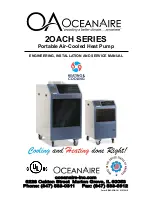
Q. Can I use a radiator valve change kit (= tapered
rubber bung kit), used when changing radiators, to
make the system a closed circuit for the power flush?
A. No. The tapered bung inserted in the cold feed pipe
will be forced out, and the expansion tank will fill up and
overflow.
Q. Can I use plastic or metal push fit caps, such as
“Speedfit” fittings, to make the system a closed circuit?
A. Yes, but check the push fit cap ‘O’ ring for wear
regularly, and replace it if in doubt.
Q. What do I do if the expansion pipe on an old system
is imperial size copper piping?
A. Why not extend the pipe slightly, using a compression
fitting with a special imperial size olive, enabling you to
add a short length of metric piping? Then use a push fit
end cap as usual.
Q. If I connect my Clearflow pump into the system
across the tails of one (removed) radiator, what
happens to that radiator? How should I clean it?
A. You’ll need to flush this separately with a hose pipe
(so pick a small radiator!).
Alternatively, some engineers will adapt the outer end
of their dump hose to fit onto one side of this removed
radiator, with another adapted tube leading from the
other side of the radiator to the drain.
This way, every time you dump, you’re putting a good
flow of water through the radiator. By the time you’ve
finished the power flush, the radiator should be very
clean.
Q. I want to keep my pump outside the house. Can I use
extension hoses?
A. Yes you can, and we can supply any length extensions
that you may wish, but we often supply an extra set of 5
metre flow and return hoses, and send them out with a
3/4” - 3/4” male nipple in one end of each hose.
This means that when you need to extend flow and
return hoses, you simply couple the new extension
hoses onto your existing flow and return hoses, and if
you sometimes need a longer dump hose, rather than
longer flow and return hoses, the 2 x 5 metre lengths can
be coupled together and added on to the existing dump
hose. This gives flexibility without the need for a van full
of hose.
Caution: longer hoses mean greater frictional losses, and
so we suggest a maximum overall length of 12 metres
per hose.
Q. Can you power flush a heating system with a thermal
store type cylinder?
A. Yes. Our advice is to isolate the thermal store cylinder
and flush the radiator and boiler circuits separately.
There are two reasons for this:
1. One cylinder manufacturer (Gledhill, though others
may take a different view), advises that their cylinders
shouldn’t be connected on the positive side of a pump
that may provide more than one bar pressure.
Although that level of pressure on the cylinder is unlikely
to be present anyway, we advise a cautious approach.
2. If you do include the thermal store in the power
flushing circuit, then instead of pumping approximately
100 or less litres of water around, you’ll be pumping
around almost three times that, and so the vital overall
flow rate will be much less than half – so not a good idea
Page 5




































